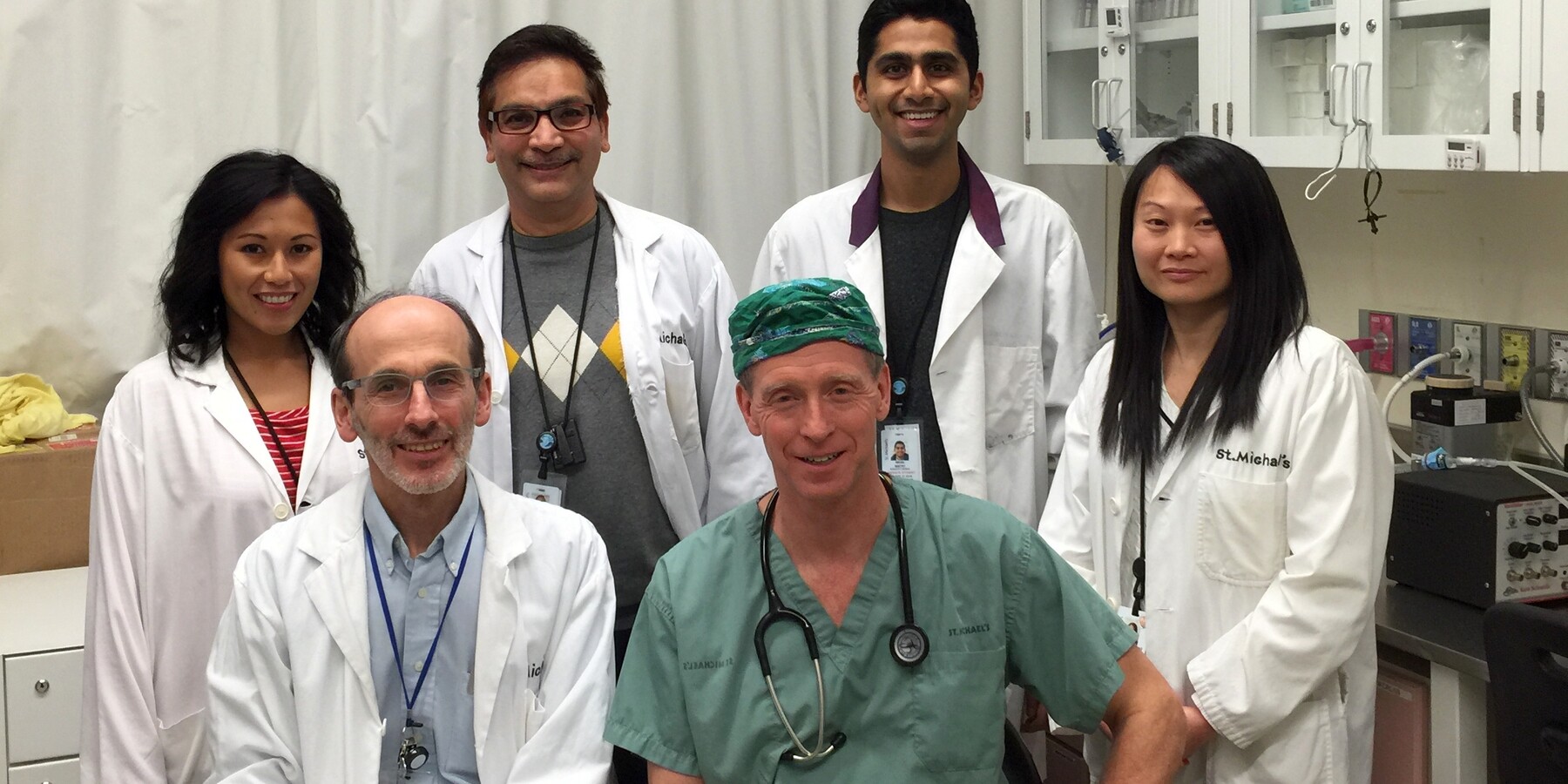Breadcrumbs
Dr. Gregory M.T. Hare and Dr. C. David Mazer

Lab Members
- Gregory M. T. Hare, MD, PhD: Principal Investigator
- C. David Mazer, MD: Principal Investigator
- Esther Lee, BScN: Reserach Coordinator
- Charmagne Crescini, MA: Research Coordinator
- Sanjay Yagnik, CCRP: Research Coordinator
- Nikhil Mistry, BSc: MSc Candidate
Contact Us
Gregory M. T. Hare, MD, PhD
greg.hare@unityhealth.to
C. David Mazer, MD
david.mazer@unityhealth.to
P: (416) 586-5270
F: (416) 586-8664
Lab Description
Hare-Mazer laboratory research has focused on defining adaptive, and maladaptive, cardiovascular mechanisms in integrative translational models of anemia, bleeding and transfusion. They have established whole animal physiological models for assessing oxygen delivery to tissue utilizing tissue Doppler measurement of blood flow and light based in vivo measurements of tissue PO2. These outcomes are compared with molecular readouts of hypoxic gene expression during acute anemia and transfusion. By coupling these physiological outcome measurements with molecular signals of tissue hypoxia, including RNA, protein and immunohistochemical analysis, they have defined hypoxic mechanisms (HIF, nNOS) of anemia-induced mortality. Utilizing these methods we continue to assess the degree cardiovascular adaptation to acute anemia and transfusion in the whole animal, and clinical models in order to gain further insight into the mechanisms of morbidity and mortality associated with anemia and transfusion in perioperative patient populations.
Research Focus
Drs. Hare and Mazer are Staff Anesthesiologists and Professors of Anesthesia, at St. Michael’s Hospital at the University of Toronto. Their clinical focus is to develop multimodal and inter-professional approaches to optimize patient outcomes through patient blood management strategies and clinical trials related to anemia, transfusion therapy, and cardiovascular outcomes. The long term research goals are to define mechanisms of anemia-induced cardiovascular morbidity and mortality, to optimize perioperative hemostasis and to design novel treatment strategies to prevent these adverse outcomes. Translational studies have identified integrative adaptive cellular (nNOS and HIF) and physiological mechanisms which promote organism survival during acute anemia. Their clinical research is currently focused on translational approaches to identify patient specific biomarkers of anemia-induced tissue hypoxia and to assess whether treatment of preoperative anemia can reduce morbidity and mortality associated with both anemia and red blood cell transfusions. Dr. Mazer has conducted large randomized clinical trials assessing important outcome in cardiovascular anesthesiology including the optimal use of antifibrinolytic agents to prevent acute blood loss (BART) and determination of the optimal hemoglobin threshold to transfuse patients undergoing cardiac surgery (TRICSIII). The overall goals are to reduce morbidity and mortality associated with acute and chronic anemia and RBC transfusion in perioperative patients with cardiovascular disease.
Selected Publications
- Curley GF, Shehata N, Mazer CD, Hare GM, Friedrich JO. Transfusion triggers for guiding RBC transfusion for cardiovascular surgery: a systematic review and meta-analysis. Crit Care Med. 2014 Dec;42(12):2611-24.
- Tsui AK, Marsden PA, Mazer CD, Sled JG, Lee KM, Henkelman RM, Cahill LS, Zhou YQ, Chan N, Liu E, Hare GM. Differential HIF and NOS Responses to Acute Anemia: Defining Organ Specific Hemoglobin Thresholds for Tissue Hypoxia. Am J Physiol Regul Integr Comp Physiol. 2014 Apr 23.
- Hare GMT, Tsui AKY, Osawa S, Shander A. Anaemia: Can we defined haemoglobin thresholds for impaired oxygen homeostasis and suggest new strategies for treatment? Best Practice & Research: Clin Anaesth. 2013 Mar;27(1):85-98. Senior Responsible Author.
- Shehata N, Burns LA, Nathan H, Hebert P, Hare GM, Fergusson D, Mazer CD. A randomized controlled pilot study of adherence to transfusion strategies in cardiac surgery.Transfusion. 2012 Jan;52(1):91-9.
- Tsui AKY, Marsden PA, Mazer CD, Adamson SL, Henkelman RM, Wilson DF, Heximer SP, El Beheiry MH, Dattani ND, Chen K, Hare GMT. Priming of hypoxia inducible factor neuronal nitric oxide synthase is essential for adaptive responses to severe anemia. Proc Natl Acad Sci. 2011 Oct 18;108(42):17544-9. Senior Responsible Author.
- Fergusson DA, Hébert PC, Mazer CD, Fremes S, MacAdams C, Murkin JM, Teoh K, Duke PC, Arellano R, Blajchman MA, Bussières JS, Côté D, Karski J, Martineau R, Robblee JA, Rodger M, Wells G, Clinch J, Pretorius R; BART Investigators. A comparison of aprotinin and lysine analogues in high-risk cardiac surgery. N Engl J Med. 2008 May 29;358(22):2319-31.